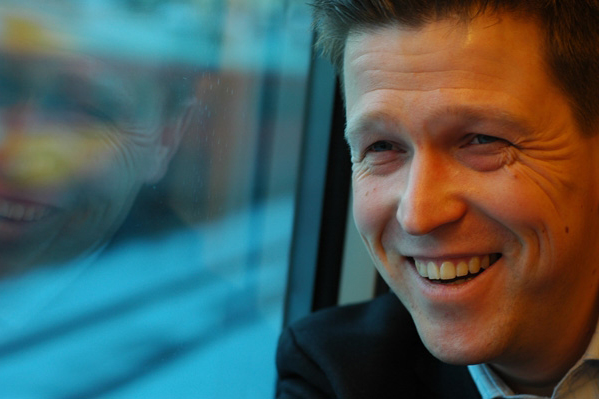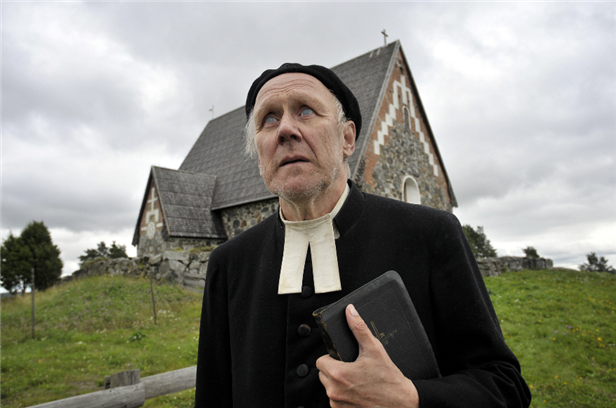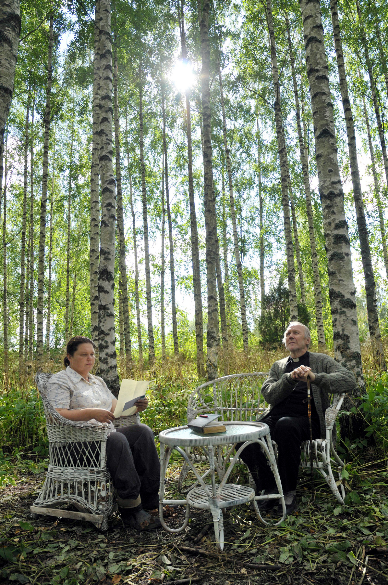12-7-09
Klaus Härö Graces the Mannheim-Heidelberg Film Festival
with Letters to Father Jacob
By Diane Sippl

The 58th International Film Festival Mannheim-Heidelberg, where the “art of cinema” is upheld above all celebrity, box office, and entertainment values, screened 32 new films this season: 17 in the International Competition section, 8 in the International Discoveries program, and 7 in the Festival Highlights segment. From November 5-15, 2009, these “twin cities” on the Neckar River, which winds gracefully through Germany's Rhineland, showed their support of visionary cinema that expresses a personal voice by offering multiple screenings of the selected films in both cities and a strong outreach project to back up this commitment called the “Mannheim Meetings” for international co-production, sales, and distribution. With the festival’s long tradition in showcasing the work of newcomers or auteurs yet unknown on the world horizon, there was a bit of a surprise but not disappointment that the top praise this year went to someone who is hardly a beginner and who for years has been lauded beyond his own region.
Prior to his participation at the Mannheim-Heidelberg festival this year, Klaus Härö had made three feature films, Elina: As if I Wasn’t There (2002), Mother of Mine (2005), and The New Man (2007). His films had already won more than 60 prizes in festivals all over the world as well as being commercially successful. In 2003, he was awarded the Ingmar Bergman Prize, the winner of which was chosen by Bergman himself. Härö's film in competition at the Mannheim-Heidelberg festival this year is his third one to win a submission to the Academy of Motion Picture Arts and Sciences in the Best Foreign Film category.
At the closing night ceremony in Mannheim’s Stadthaus, the festival’s hub, the Main Award of Mannheim-Heidelberg went to Klaus Härö from Finland for his elegant and delicately crafted Letters to Father Jacob. The International Jury announced, “With this film, the director Klaus Härö has created a genuine work of art which makes the audience feel both elated and taken seriously at the same time. This is how cinema should be.”

That feeling of uplift and respect recognized by the festival’s jury is perhaps best described by Klaus Härö himself. His film opens as a young woman exits a prison based on a plea for clemency issued by someone from the outside and honored by the warden. In the festival’s thoughtfully prepared, stimulating catalog, Härö reflects upon the question of what a “pardon” can mean:
I believe in forgiving, but not necessarily in the sense it is usually referred to. Even though you can forget after forgiving, mere forgetting is not enough. When a negative matter comes to your mind later again, it might cause surprisingly angry and bitter feelings. To forgive is to make a conscious decision not to avenge even though you would have the right to. Forgiving is the only way to break the vicious circle of vengeance and bitterness.
Letters to Father Jacob is a seemingly simple and gentle story that suddenly arrives at layers of dark personal history and shifting motives in the behavior of its female protagonist. The following is a transcript of the post-screening Q & A (moderated by Rüdiger Suchsland from the festival selection committee) with the audience and writer-director of Letters to Father Jacob, Klaus Härö, along with the film’s two producers, Risto Salomaa and Lasse Saarinen.
What’s your relation to Ingmar Bergman? You received an award in his name.
Klaus Härö If you’ve ever been in a Finnish school, you know you can never escape the headmaster — in this case, Bergman. I can’t escape him, but my favorite filmmakers are Billy August and Jan Troell, who are a little lighter and hold a big love for their characters. Yet Bergman is an endless learning.
Regarding Scandinavia, you are Finnish but you live and work partly in Sweden.
KH Finland has a
very small film industry. The Danes are
only a hundred miles away — how come their films are light years ahead of ours?
I belong to a minority in Finland
speaking Swedish. Their films are so
warm and human. Letters to Father Jacob is not my first film, yet if I had made
only one, I would like it to have been this. My first was a Swedish production. Both of my other
films were Finnish-Swedish co-productions. Scandinavia
has given so much to me. Two of my films have already gone to the Oscars; this is the third.
What is the background of Letters to Father Jacob?
KH You can work for years on a film, and suddenly something comes alive that you didn’t expect. As we were working on a film, we got further and further from our goal. I was at home one day with the flu and wanted to get something done. And that day a script arrived. Usually they come with a letter. But this one, no. I was a little annoyed. I don’t accept scripts from people I don’t know. It said ‘J. Makkonen.’ Was this a man? A woman? I started reading. On page 10 I thought, ‘There’s something here.’ On page 20 I imagined the actors. On page 70 I said to myself, ‘Wow — Why didn’t I think of this?’ I thought it would make a nice hour-long TV movie. I started calling and found out that ‘J’ was a woman, Jaana Makkonen, a social worker who had attended a screenwriting course. She sent me the script because she had promised her teacher she would.
Lasse Saarinen Jaana didn’t believe it was Klaus Härö on the phone.
Risto Salomaa Normally we take several months to decide about a script, but we decided immediately that this one had to be made and that we would make it.

Why was it so intriguing?
KH Usually religious people on film are either saints or just want their money. I liked the combination of holiness and humor — it’s something new. This movie is about who you are when you don’t have your mission or success, when your job or what you hope to accomplish is taken away. What is the value of a person under these circumstances?
RS When you read a jewel, you know it immediately. This is a beautiful story of love and forgiveness.
I’m confused: the postman breaks into the house and says there are no more letters.
KH He enters the house just to see if the old man is okay, because the woman is a murderess. It’s the way in the countryside. The main actor, Heikki Nousiainen, has played so many roles — in theatre as well. He’s the Henry Fonda of Finnish films. Kaarina Hazard, who plays Leila, is a Swedish journalist and academic. She’s very honest, and she has the ability to put the movie away. She’s very blunt but there’s an honesty in what she does, too. She’s a feminist.
What was your approach with the storytelling?
KH As I said, at first we thought we’d make a one-hour film for television, but it got longer and we decided to make it as cinema for festivals. I was intrigued by how much you can take away from a film. I took away as much as possible.
Will Jaana Makkonen write for you again?
LS She’s a mysterious person. She never questioned the script or came to any shoot or to the premiere. We thought she’d never write a script again, but now she’s back at it.
KH I wanted to be very fair with her and show her each change I made while shooting it. She was a social worker and kindergarten teacher, and she finally wrote another script. She trusted us and we wanted to make the best of it. There’s so much ‘me first’ in this business, so her attitude of respect is quite present throughout the production.
You should next make her story.
KH She’s probably writing it now.
Does something distinguish Finnish films from others in Scandinavia?
KH Swedish and Danish films are just so much better, more touching. They’re better made, and they touch the heart. We have a bit of clumsiness in Finnish films. Theirs are more polished.
There’s an uncanny modesty in these words from an artist whose film is at once taut, surprisingly moving, and astonishingly beautiful. Letters to Father Jacob is a prize in and of itself.
Letters to Father Jacob
Director: Klaus Härö; Producers: Risto Salomaa and Lasse Saarinen; Screenplay: Klaus Härö; Cinematographer: Tuomo Hutri; Editor: Samu Heikkilä; Production Designer: Kaisa Mäkinen; Music: Dani Strömbäck; Costume Designer: Sari Suominen; Sound Designer: Kirka Sainio; Original Script: Jaana Makkonen.
Cast: Kaarina Hazard, Heikki Nousiainen, Jukka Keinonen, Esko Roine.
Color, 35mm, 74 minutes. In Finnish with English subtitles.